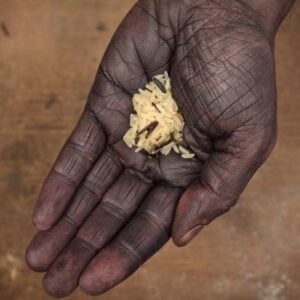In 2024, around 673 million people — approximately 8.2% of the global population — experienced hunger, marking a slight decline from 2023 and 2022. However, progress remains uneven, with hunger increasing in many parts of Africa and western Asia. These figures are part of the State of Food Security and Nutrition in the World (SOFI) 2025 report, released by five UN agencies during the UN Food Systems Summit Stocktake (UNFSS+4) in Addis Ababa.
The global hunger estimate reflects a modest improvement, down by 15 million from 2023 and 22 million from 2022. Still, the total remains higher than pre-pandemic levels, due in part to sustained food inflation. Between 638 and 720 million people were affected by hunger in 2024, with 673 million as the midpoint estimate.
There were encouraging trends in southern Asia and Latin America. Undernourishment in Asia dropped from 7.9% in 2022 to 6.7% in 2024, impacting 323 million people. Latin America and the Caribbean also saw undernourishment fall to 5.1%, down from a peak of 6.1% in 2020, affecting 34 million people.
In contrast, hunger in Africa and western Asia worsened. In Africa, over 20% of the population — about 307 million people — faced hunger in 2024. Western Asia had 12.7% of its population, or over 39 million people, facing similar conditions. These regions include several countries enduring long-term food crises.
Projections suggest that by 2030, 512 million people may be chronically undernourished — nearly 60% of them in Africa — posing a major obstacle to achieving SDG 2: Zero Hunger.
Globally, food insecurity slightly decreased from 28.4% in 2023 to 28.0% in 2024, affecting around 2.3 billion people. This remains significantly higher than pre-pandemic levels, with 335 million more people affected than in 2019.
Nutrition indicators show mixed progress. The prevalence of child stunting dropped from 26.4% in 2012 to 23.2% in 2024. However, rates of child overweight (5.5% in 2024) and wasting (6.6% in 2024) have remained relatively unchanged. Exclusive breastfeeding among infants under six months rose from 37% in 2012 to nearly 48% in 2023.
Adult obesity increased from 12.1% in 2012 to 15.8% in 2022. Meanwhile, anaemia among women aged 15–49 rose to 30.7% in 2023, up from 27.6% in 2012. Dietary diversity remains a concern, with only one-third of children aged 6–23 months and two-thirds of women aged 15–49 meeting minimum standards.
The report also analyzes the global food price surge from 2021 to 2023. Contributing factors included post-COVID fiscal responses, the war in Ukraine, and extreme weather. Food price inflation outpaced general inflation, peaking at 13.6% in January 2023.
Low-income countries bore the brunt of price increases, with food inflation reaching 30% in May 2023. Despite rising costs, the number of people unable to afford a healthy diet fell globally from 2.76 billion in 2019 to 2.60 billion in 2024. However, in low-income nations, that number increased from 464 million to 545 million. Lower-middle-income countries also saw a rise, from 791 million to 869 million, excluding India.
To address food price inflation and improve food security, the report calls for targeted fiscal support, sound monetary policy, and investments in agricultural research, infrastructure, and market systems to boost resilience and productivity.




